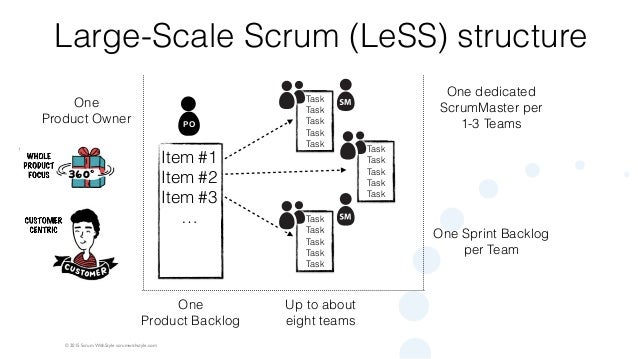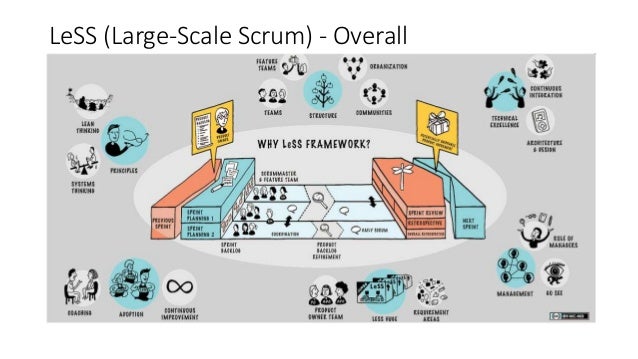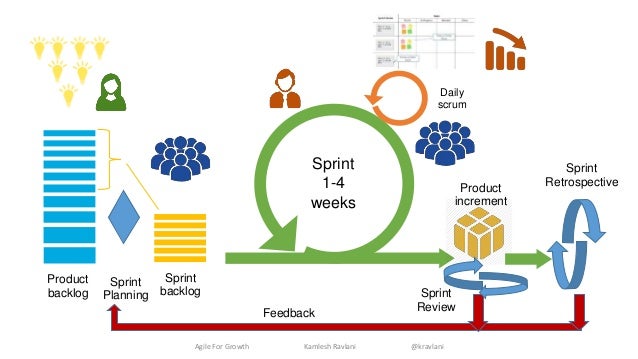 | ||
Large-Scale Scrum (LeSS) is a product development framework that extends Scrum with scaling rules and guidelines without losing the original purposes of Scrum.
Contents
- History
- LeSS Overview
- Large Scale Scrum is Scrum
- Empirical Process Control and Transparency
- More with LeSS
- Whole Product Focus
- Customer Centric
- Lean and Continuous Improvement Towards Perfection
- Systems Thinking
- Queue Theory
- LeSS Rules
- References

LeSS stands for the general techniques for scaling Scrum and Agile Development to more than one team and it is the name for the basic LeSS Framework which works up-to around 8 teams. The second LeSS Framework is named "LeSS Huge" and introduces additional scaling elements for development up to hundreds of developers.

History

"Scaling Scrum starts with understanding and being able to adopt standard real one-team Scrum. Large-scale Scrum requires examining the purpose of single-team Scrum elements and figuring out how to reach the same purpose while staying within the constraints of the standard Scrum rules."

Bas Vodde and Craig Larman evolved the LeSS framework from their experiences working with Large-Scale product development, especially the work in telecom and finance industry. It evolved by taking Scrum and trying many different experiments and discovering what works. In 2013, the experiments were solidified by the LeSS Framework rules, defining LeSS.
LeSS Overview
LeSS consists of:

Of these, the principles and rules define LeSS and the guides and experiments give guidance to product groups adopting LeSS. The latest description is on the LeSS Online site.
Large-Scale Scrum is Scrum
Large-Scale Scrum is Scrum scaled up to multiple teams. It isn't a bigger process that includes Scrum, but is Scrum at its core.
Empirical Process Control and Transparency
These principles are directly taken from Scrum where the product and process has to be evolved following inspect-adapt cycles or experiments. The content of the product and the process used for development is never fixed but constantly evolving. Transparency is required in order to see the current reality and improve.
More with LeSS
When scaling up development, there is a tendency to add more process, more roles, more artifacts, more control. These additions often cause overhead and rigidity. The More with LeSS principles assume there is a way of scaling up without adding this additional overhead. It assumes that tailor down is fundamentally wrong. Instead, concepts and processes need to be scaled up based on experiences of the people in the development. Therefore, the intention of LeSS is to descale organization complexity, dissolving unnecessary complex organizational solutions, and solving in simpler ways. Less roles, less management, less organizational structures.
Whole-Product Focus
Customers don't want components but whole products. When scaling up development, it is easy to lose the focus of the whole product and the whole experience. Therefore, we need to constantly remind everyone involved in development to have the whole-product focus so they make decisions with the whole product in mind.
Customer-Centric
When working on the technical parts of a large system, it is easy to forget the actual users and customers and this often leads to sub-optimal decisions in the development. Keeping the customer-centric focus is essential for maximizing value delivered.
Lean and Continuous Improvement Towards Perfection
Lean Manufacturing and Lean Product Development have fundamentally altered the way organizations work. One-piece flow has replaced big-batch development. The focus on people and continuous improvement changes how systems work by continuously applying kaizen and focusing on improvements.
Systems Thinking
In large-scale development, lots of things happen and it is hard or even impossible to see how everything relates to everything. Systems Thinking provides concepts and tools that help in trying to "see the whole" and how things influence each other, leading to decisions that optimize the total value rather than locally optimize a step or phase.
Queue Theory
Product Development has lots of queues... places where the information flow stops and waits. Understanding the impact of these queues and how queues affect throughput is essential for improving product development.
LeSS Rules
The LeSS Rules define the LeSS Framework and is a 2-page summary what an organization has to do in order to adopt LeSS (one additional page for LeSS Huge). The rules are divided in:
